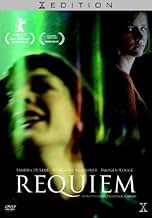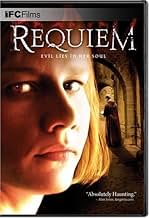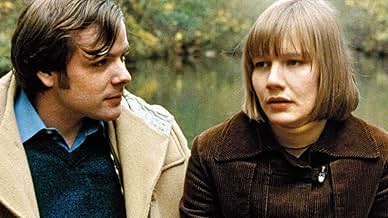CALIFICACIÓN DE IMDb
6.9/10
6.5 k
TU CALIFICACIÓN
Agrega una trama en tu idiomaA young woman with epilepsy suffers a breakdown during her first year at university, then decides to seek help from a priest in battling the troubles associated with her strict upbringing.A young woman with epilepsy suffers a breakdown during her first year at university, then decides to seek help from a priest in battling the troubles associated with her strict upbringing.A young woman with epilepsy suffers a breakdown during her first year at university, then decides to seek help from a priest in battling the troubles associated with her strict upbringing.
- Premios
- 16 premios ganados y 19 nominaciones en total
- Dirección
- Guionista
- Todo el elenco y el equipo
- Producción, taquilla y más en IMDbPro
Argumento
¿Sabías que…?
- TriviaSandra Hüller's feature film debut.
- ConexionesFeatured in The Making of 'Requiem' (2006)
- Bandas sonorasDown 'n' Out
Performed by Light of Darkness
Written by J. Latimer, B. Grant, M. Reoch and M. Bebert
Courtesy of MOP-Musikverlag Hans Sikorski KG
With kind permission of Second Battle Records
Opinión destacada
Requiem (2006)
When a positive, well-meaning, troubled young woman meets an ungodly end at the hands of religious zealots, it matters that it is based on fact. So when you see what is going on here to this girl, leaving for college and struggling with some kind of mental disorder, you not only feel for the character. You are astonished about a culture that still has room for this.
The portrayal of mental illness has transformed enormously in the history of movies partly because psychology has changed, too, from Freud and Jung to now. Even looking at the last few minutes of "Psycho" (which everyone conveniently forgets), you see that arch confidence and inaccuracy of mid-century psychology. And now, in 2011, we know how to treat epilepsy (the purported disorder of the main character) and even schizophrenia (likely an additional problem judging by the symptoms) with some level of control.
But this movie is set between the two, around 1971, and so with hindsight we are shocked and frustrated by the people around our main character showing either a "get over it" attitude of a more deadly "god will intervene" kind of attitude. Neither was a good thing.
And yet this woman, played with unusual conviction and brilliant by Sandra Huller, is all about trying to survive. Because of her upbringing she interprets some events as God rejecting her (she can't reach her rosary beads during one epileptic fit), and of course this leads to priests, and to the priests thinking they know how to possibly cure the poor girl. Eventually real life exorcisms are performed, and in a weird synchronicity, a real-world version of the 1973 American film, "The Exorcist."
This one is German, and instead of making everything strange, it makes everything universal. We sometimes think of religious extremism as an American trait, but in fact it is everywhere. This version gives it a Roman Catholic overtone and yet grounds in the the real world, where priests are rather ordinary folk. not mythic brooding types (though the younger priest here is, vaguely, a German Damien). The original "The Exorcist" it turns out was based on a German Lutheran (not Catholic) boy, yet another small echo of one movie to the other.
The comparisons can go too far, for sure. This is a modern movie in what is one thread of contemporary European filmmaking--understated, realist, tautly filmed, issue based movies, many of them from Denmark or Germany. It's a great complement to what is being made here (in the U.S.), with a different flair for dialog and sometimes a more elaborate production sense. This is not small budget but it is straight ahead and almost bare bones in its approach, thoughtfully made and edited. And pertinent now in the sense that fanaticism in any form is to be questioned before it's too late.
When a positive, well-meaning, troubled young woman meets an ungodly end at the hands of religious zealots, it matters that it is based on fact. So when you see what is going on here to this girl, leaving for college and struggling with some kind of mental disorder, you not only feel for the character. You are astonished about a culture that still has room for this.
The portrayal of mental illness has transformed enormously in the history of movies partly because psychology has changed, too, from Freud and Jung to now. Even looking at the last few minutes of "Psycho" (which everyone conveniently forgets), you see that arch confidence and inaccuracy of mid-century psychology. And now, in 2011, we know how to treat epilepsy (the purported disorder of the main character) and even schizophrenia (likely an additional problem judging by the symptoms) with some level of control.
But this movie is set between the two, around 1971, and so with hindsight we are shocked and frustrated by the people around our main character showing either a "get over it" attitude of a more deadly "god will intervene" kind of attitude. Neither was a good thing.
And yet this woman, played with unusual conviction and brilliant by Sandra Huller, is all about trying to survive. Because of her upbringing she interprets some events as God rejecting her (she can't reach her rosary beads during one epileptic fit), and of course this leads to priests, and to the priests thinking they know how to possibly cure the poor girl. Eventually real life exorcisms are performed, and in a weird synchronicity, a real-world version of the 1973 American film, "The Exorcist."
This one is German, and instead of making everything strange, it makes everything universal. We sometimes think of religious extremism as an American trait, but in fact it is everywhere. This version gives it a Roman Catholic overtone and yet grounds in the the real world, where priests are rather ordinary folk. not mythic brooding types (though the younger priest here is, vaguely, a German Damien). The original "The Exorcist" it turns out was based on a German Lutheran (not Catholic) boy, yet another small echo of one movie to the other.
The comparisons can go too far, for sure. This is a modern movie in what is one thread of contemporary European filmmaking--understated, realist, tautly filmed, issue based movies, many of them from Denmark or Germany. It's a great complement to what is being made here (in the U.S.), with a different flair for dialog and sometimes a more elaborate production sense. This is not small budget but it is straight ahead and almost bare bones in its approach, thoughtfully made and edited. And pertinent now in the sense that fanaticism in any form is to be questioned before it's too late.
- secondtake
- 29 oct 2011
- Enlace permanente
Selecciones populares
Inicia sesión para calificar y agrega a la lista de videos para obtener recomendaciones personalizadas
- How long is Requiem?Con tecnología de Alexa
Detalles
- Fecha de lanzamiento
- País de origen
- Sitio oficial
- Idioma
- También se conoce como
- Requiem
- Locaciones de filmación
- Productoras
- Ver más créditos de la compañía en IMDbPro
Taquilla
- Total en EE. UU. y Canadá
- USD 9,600
- Fin de semana de estreno en EE. UU. y Canadá
- USD 3,309
- 22 oct 2006
- Total a nivel mundial
- USD 262,460
- Tiempo de ejecución1 hora 33 minutos
- Color
- Mezcla de sonido
- Relación de aspecto
- 2.35 : 1
Contribuir a esta página
Sugiere una edición o agrega el contenido que falta

Principales brechas de datos
What is the Spanish language plot outline for La posesión (2006)?
Responda













